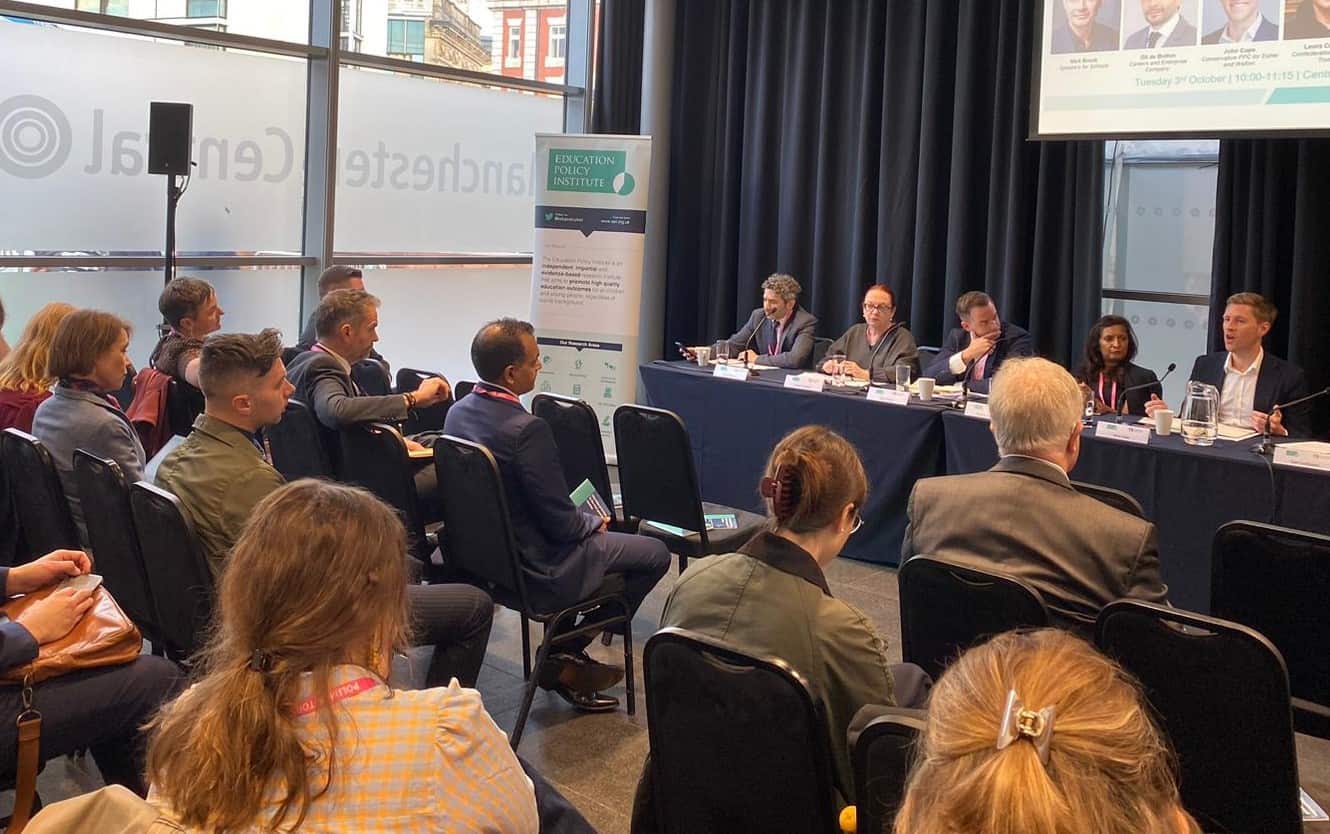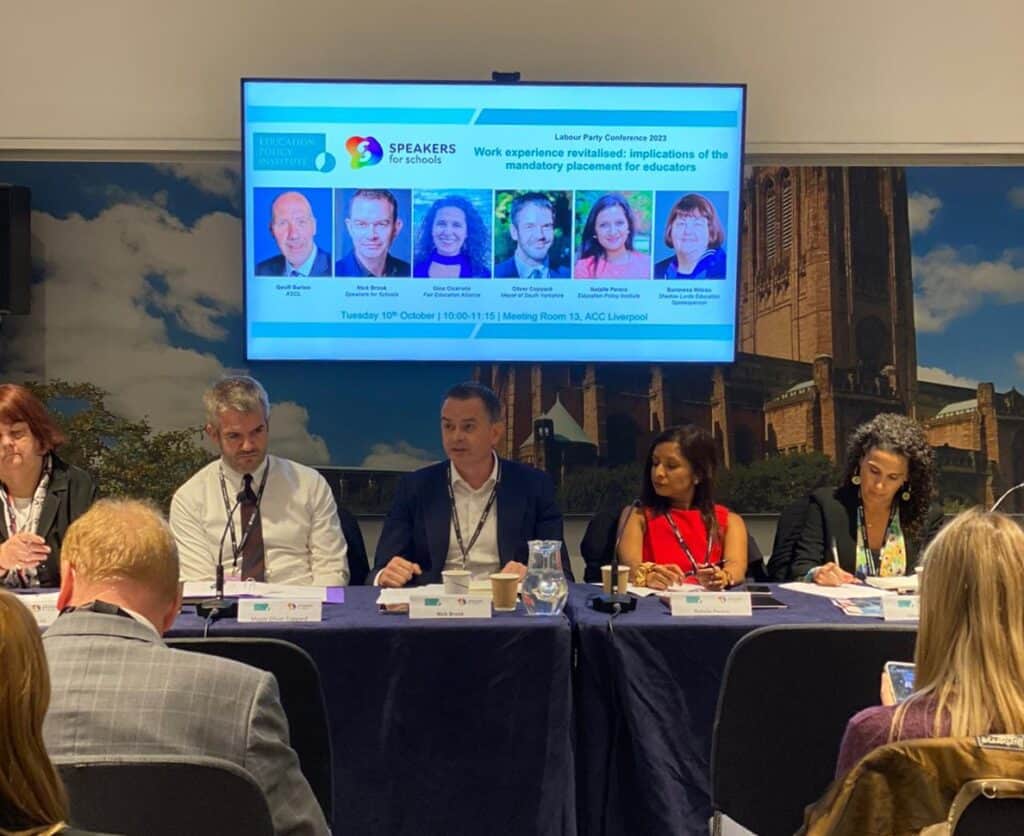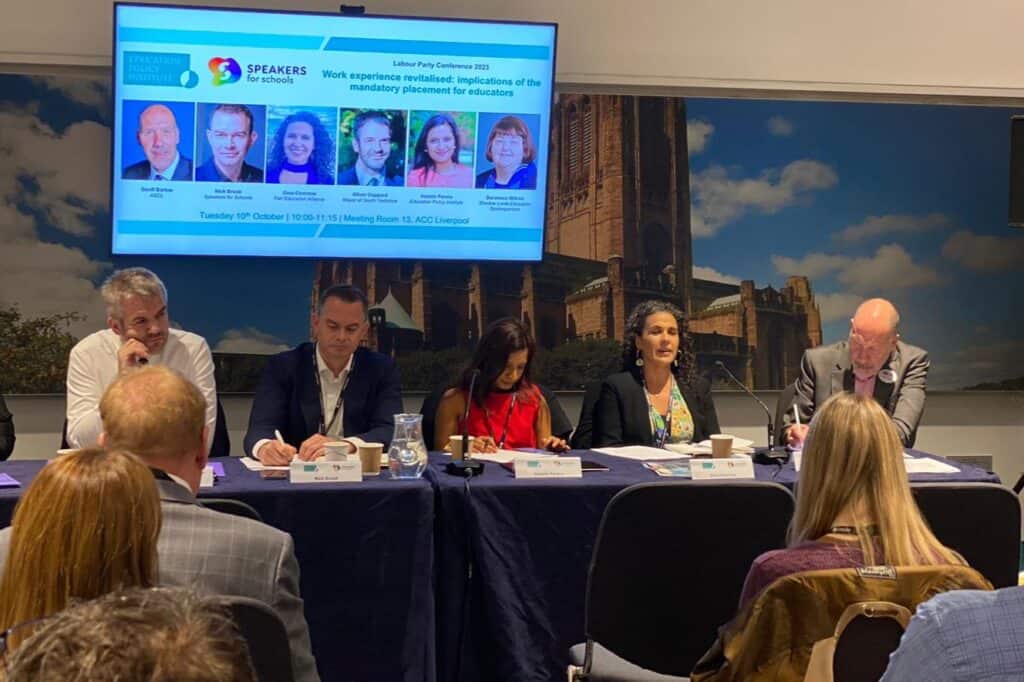Our Top Takeaways from the Conservative and Labour Party Conferences

October was another busy month for Speakers for Schools on the policy front with our CEO Nick Brook heading to the North-West of England for two lively fringe panel events at the Conservative and Labour Party Conferences that each featured an impressive lineup of experts from the field of education and careers education.
Drawing on the interest sparked by our recent Work Experience for All campaign, we held compelling discussions around work experience with three main areas of focus:
- the importance of work experience as a lever for growth
- how work experience could be embedded into the curriculum
- the implications of making work experience mandatory for educators
Who was at the Conservative Party Conference fringe event?
The first of the panel discussions took place in Manchester as a fringe event to the Conservative Party conference where Nick was joined by Oli de Botton (CEO of The Careers & Enterprise Company), Leora Cruddas CBE (Chief Executive of the Confederation of School Trusts), and Carl Cullinane (Director of Research & Policy at The Sutton Trust), chaired by Natalie Perera (Chief Executive of the Educational Policy Institute).
Three key takeaways from the Conservative Party Conference fringe event:
- Career education information advice and guidance (CEIAG) guidance needs to keep pace with emerging skills shortages.
The world of work is changing fast so to prepare young people effectively, we need to modernise the careers guidance offered and ensure teachers and careers leaders are up to speed. - Any policy change to implement universal work experience needs to focus on evidence and impact.
To justify the disruption and investment, it is not sufficient to purely look at the issue from an ideological point of view. We need evidence to measure what works best – this means defining what constitutes the best work experience model in terms of impact and being prepared to take our time to get it right. It is also important to recognise that this is not a carrot-and-stick situation, we need to win minds and hearts about the importance of a revitalised work experience system that works for educators and employers and delivers for young people. Rushing to mandation without thinking this through will only cause further inequality. - Employers are a key part of the puzzle.
Switching from optional to mandatory work experience requires large-scale collaboration from all stakeholders. To ensure success, we need employers of different sizes and sectors onboard and for them to fully grasp the value of work experience and playing their part.

Were the panellists aligned in their views?
Together, the panellists talked about work experience as a driver for growth and skills and acknowledged that work experience should be seen as part of a wider range of career activities and not a separate matter. Thy agreed that an opportunity gap exists and only the privileged few have parental networks that allow them to get a foot in the door as things stand.
Although collectively the panellists agreed that careers education requires improvement and that education in general should be a force for social justice, one panellist expressed concern that a curriculum tied too closely to the needs of the economy may be a step too far.
Who was at the Labour Party Conference fringe event?
A week later, Nick was in Liverpool at our fringe event with EPI at the Labour Party Conference with Geoff Barton (General Secretary of the Association of School and College Leaders), Gina Cicerone (co-CEO of the Fair Education Alliance), Oliver Coppard (Mayor of South Yorkshire), chaired by Natalie Perera (Chief Executive of the Educational Policy Institute), and Baroness Judith Wilcox (Shadow Lords Spokesperson on Education).
Three key takeaways from the Labour Party Conference fringe event:
- Passing exams is great, but the skills learned along the way carry you throughout your career journey. We need an education system that values skills not just academic attainment, so that every young person has the chance to achieve their potential and we are not perpetuating a culture of elitism.
- Employers, educators, and other stakeholders need to collaborate more closely.
Building a more equitable and prosperous society requires employers to invest more in helping young people acquire essential skills and learn more about careers through work experience. Closing the opportunity gap requires a collaborative effort that is supported centrally. - We must learn from best practice and scale up slowly.
Despite the sense of urgency to close the equity gap, it is important to take a measured approach with a focus on quality and impact when it comes to rolling out any plan to mandate work experience.
Were the panellists aligned in their views?
Once again there was a consensus among the panellists that, under the current education system, young people’s access to opportunity can vary greatly depending on the young person’s background and/or geographical location.
However, whilst the panellists agreed that there is a major fairness and equity issue at the heart of our education system, they also recognised that mandating work experience would be a good way to assure compliance but a bad way to assure the quality of the work experience.

Summary
There were many parallels between the opinions and concerns expressed during the two events with both sets of panellists recognising that the current system is not fit for purpose and advocating for an approach that enables young people to access high-quality work experience regardless of their parental networks or where they live. Panellists also recognise the progress made thus far in delivering school and college career provisions across the country with mentions to great practices that take this very seriously.
Both groups recognised the complexity involved in changing the curriculum to make work experience mandatory – not only in terms of managing the different stakeholder inputs and requirements but also in terms of assuring the quality of the outcomes at scale.
Across both groups, there was an appetite to find a way to reduce the current opportunity gap and a shared understanding that for the best long-term result policymakers, employers, educators, and experts from the third sector need to take a consultative and collaborative approach to flesh out a plan that takes account of the nuanced nature of the issue at hand. In practice, this means starting by researching and agreeing on an evidence-based definition of what high-quality work experience would look like and then working towards a staged rollout that makes adequate provision for all parties to play their part in delivering impactful placements for young people.